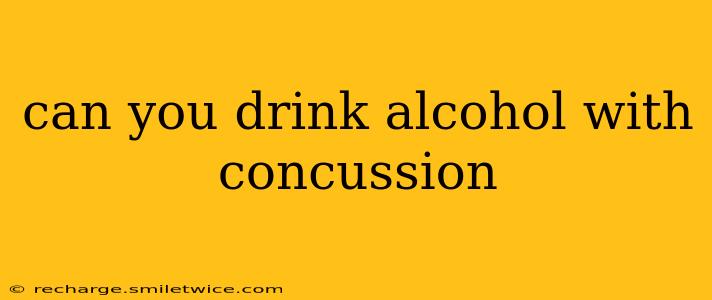A concussion, also known as a mild traumatic brain injury (mTBI), is a serious injury that requires careful management. One frequently asked question surrounding concussion recovery revolves around alcohol consumption. The short answer is: no, you should absolutely not drink alcohol if you have a concussion. This is crucial for several reasons, all impacting your recovery and long-term brain health.
Why Alcohol is Harmful After a Concussion
Alcohol acts as a central nervous system depressant. This means it slows down brain activity. After a concussion, your brain is already vulnerable and trying to heal. Introducing alcohol further hinders this process, potentially exacerbating symptoms and prolonging recovery time.
Here's a breakdown of the harmful effects:
- Increased Swelling and Inflammation: Alcohol can increase inflammation in the brain, which is already present after a concussion. This extra inflammation can prolong healing and potentially lead to more serious complications.
- Impaired Healing: The brain needs time and resources to repair itself after a concussion. Alcohol interferes with this process, hindering the body's natural healing mechanisms.
- Exacerbated Symptoms: Alcohol can worsen common concussion symptoms such as headaches, dizziness, nausea, and cognitive impairment (difficulty concentrating, memory problems).
- Increased Risk of Complications: In some cases, alcohol consumption after a concussion can increase the risk of developing post-concussion syndrome (PCS), a condition characterized by persistent symptoms lasting weeks, months, or even years after the initial injury.
- Interaction with Medications: If you're prescribed medication for your concussion symptoms (such as pain relievers), alcohol can interact negatively, potentially causing adverse effects or reducing the medication's effectiveness.
How Long Should You Avoid Alcohol After a Concussion?
There's no single answer to how long you should abstain from alcohol after a concussion. It's best to consult your doctor or a healthcare professional. The recovery time varies depending on the severity of the injury and individual factors. However, many medical professionals recommend complete abstinence until you are fully recovered and cleared by a physician. This often involves a period of several weeks, possibly longer.
What Happens if You Drink Alcohol After a Concussion?
The consequences of drinking alcohol after a concussion can range from mild to severe. You might experience a worsening of your symptoms, a prolonged recovery period, or even more serious complications. It's a risk that is simply not worth taking.
Can I Drink Alcohol if I Think I Have a Concussion?
If you suspect you have a concussion, seek medical attention immediately. Do not self-diagnose or attempt to treat yourself. A doctor can properly assess your condition and provide appropriate guidance. Avoid alcohol until you've received a diagnosis and been cleared by a healthcare professional.
What are the Symptoms of a Concussion?
Recognizing the signs of a concussion is crucial for prompt medical attention. Symptoms can vary, but common ones include:
- Headache
- Dizziness
- Nausea and vomiting
- Blurred vision
- Sensitivity to light and sound
- Confusion
- Memory problems
- Difficulty concentrating
- Balance problems
- Sleep disturbances
- Irritability or mood changes
If you experience any of these symptoms after a head injury, seek immediate medical care.
Conclusion
Avoiding alcohol after a concussion is vital for your recovery and long-term brain health. The risks significantly outweigh any potential benefits. Always consult a doctor for personalized advice and guidance on your recovery. Prioritize your health and well-being by making informed decisions about your post-concussion care.
